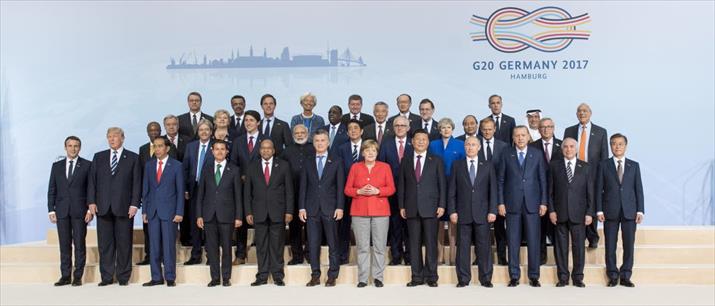|
||||||||||
| Home Nation World Business Opinion Lifestyle ChinAfrica Multimedia Columnists Documents Special Reports |
|
||||||||||
| Home Nation World Business Opinion Lifestyle ChinAfrica Multimedia Columnists Documents Special Reports |
| China |
| From Hangzhou to Hamburg: Africa at the Center |
| Though South Africa is the only member of G20 representing Africa, the continent was an important topic for discussion among world leaders at the G20 Summit in Hamburg |
| | VOL.9 August 2017 ·2017-08-03 |

In an exclusive interview with ChinAfrica, Zhou Jinyan, Assistant Researcher with the Institute of West-Asian and African Studies of the Chinese Academy of Social Sciences, holds that the G20 Hamburg Summit has provided large space for China-Germany-Africa trio cooperation. Her excerpted ideas follow:
GERMANY launched two important Africa-focused initiatives during its G20 presidency this year. One is Compact with Africa put forward by Federal Ministry of Finance of the country, aiming at taking joint measures to improve sustainable infrastructure, enhance investment framework and support education and capacity building in Africa. The initiative, participated by world multilateral financial institutions such as the African Development Bank, the International Monetary Fund and the World Bank, is open to all African countries. The other initiative is the Marshall Plan with Africa proposed by Germany's Federal Ministry for Economic Cooperation and Development. This comprehensive initiative consists of three interconnected pillars: economic activity, trade and employment; peace, security and stability; and democracy, rule of law and human rights.
China held the G20 presidency last year and has been actively participating in G20 mechanism construction. At the Hangzhou G20 Summit last September, supporting African industrialization was included in the summit communiqué, the first in G20 history. This year, Germany continued to give paramount importance to the 2030 Agenda for Sustainable Development and African cooperation as part of the summit.
Previously, G20 summits mainly focused on topics of concern to developed countries, while issues related to developing countries such as development and infrastructure construction were marginalized. However, after the Hangzhou and Hamburg summits, which focused on African issues, the bloc started showing greater concern to poverty elimination and development of non-member states, improving its inclusiveness. China remained true to its position that "G20 not only belongs to its members, but also the whole world" at the Hamburg Summit.
In addition, China also plays an active role in coordinating emerging countries in multilateral mechanisms. During the G20 Hamburg Summit, Chinese President Xi Jinping presided over the BRICS Leaders' Informal Meeting, which also issued a communiqué indicating the stances of emerging economies on G20 topics. According to the communiqué, the BRICS nations uphold a more inclusive, balanced, and open world economy, firmly support a rule-based, transparent, non-discriminatory, open and inclusive multilateral trading system, implementation and enforcement of existing WTO rules and commitments, and oppose protectionism. In a critical moment when protectionism and anti-globalization are on the rise, China and other emerging nations have become the mainstream force in global governance mechanisms such as the G20.
Wider horizon
The German Government issued a series of Africa-related initiatives during its G20 presidency, indicating that it attaches importance to the continent. Undoubtedly, the most important reason is the refugee crisis. The German Government has realized that the root cause of the crisis is poverty and inequality. Thus, Germany hopes to reduce the number of refugees through strengthening sustainable development of refugee-source countries in Africa by increasing jobs and youth development opportunities in their own countries.
By launching these Africa-related initiatives, the German Government hopes to go beyond the traditional assistance model and provide a better environment for its private sector to participate in African economic development. For this purpose, it also pays attention to the wording of the documents, such as replacing "for Africa" with "with Africa."
However, efforts still need to be made to ensure full participation of the continent. Take the Marshall Plan with Africa for example, which failed to include African countries in its planning stage. As a result, it mainly reflects the ideas of the German Federal Ministry for Economic Cooperation and Development on Africa's sustainable development. Hence, Germany should expand its horizon and regard Africa not as a problem, but as a partner with whom problems can be solved.

Trio cooperation
China and Germany can work closely in various aspects because of their increasingly shared vision on global governance. On African development, China, as an emerging country, and Germany, as a member of Development Assistance Committee of the Organization for Economic Cooperation and Development, are increasingly converging in terms of development and cooperation philosophy.
In promoting African development, China's model combining government aid, trade and investment used to be criticized by Western aid providers, including Germany. However, the two initiatives launched by Germany (the Marshall Plan with Africa and Compact with Africa) are all centered on promoting private investment. The change shows the German Government has realized the defects of traditional ways of assistance and accepted the philosophy of promoting investment with assistance through learning from emerging countries such as China.
Hand in hand
There is an opportunity for China-Germany-Africa cooperation, which should be conducted under the guiding principle of "proposed, consented and led by Africa" put forward by the Chinese Government so as to align the initiatives of Germany, the 10 Sino-African cooperation plans put forward at the Johannesburg Summit of the Forum on China-Africa Cooperation in late 2015 and the AU's Agenda 2063. The followings are some of the potential areas for China-Germany-Africa cooperation.
First, job creation for young people. At the G20 Hamburg Summit, the German Government promoted the G20 Initiative for Rural Youth Employment, focusing on Africa. According to the initiative, efforts will be made to create approximately 1.1 million new jobs benefitting young people, including those in rural Africa by 2022, and provide innovative employment-oriented skills development projects for at least 5 million young people over the next five years, with particular attention to rural young women and men in Africa.
China also pays attention to training African youth in its cooperation with African countries. Currently, China is energetically promoting cooperation plans such as agricultural modernization and industrialization. From 2016-18, China will provide opportunities for 40,000 African people to come to China for technology and management skill training and train 200,000 vocational technicians for African countries.
Second, improvement of public health system. The G20 Hamburg Summit listed safeguarding against health crises and strengthening health systems as one of the priorities. The outbreak of Ebola in West African countries such as Liberia and Sierra Leone in 2014 not only caused serious casualty in Africa, but also threatened Europe and the Americas. After the outbreak of the epidemic, Germany's global health policy underwent a great change, making the country an active supporter of global public health governance.
China has been making important contribution to the public health in Africa. Currently, China's medical aid system for Africa is changing from sending medical teams and building hospitals to helping improve public health system. Medical and health service is closely related to African people's livelihood and thus can be an area for China-Germany-Africa cooperation.
The efforts of promoting African development proposed at the G20 Hamburg Summit should not be diluted by the divergences within the summit and protests outside the summit. Such efforts and the achievements made in promoting African development indicate that G20 is the global governance mechanism with the goal of realizing wellbeing of the entire human race. African development agendas proposed at G20 have opened a new chapter for China-Germany-Africa cooperation under the G20 framework.
Besides making political commitments, China and Germany should also show their determination to promote global governance through their actions. The two countries should work together to promote African development as an important agenda of future G20 summits and increase the representativeness of African countries in the framework.
| About Us | Contact Us | Advertise with Us | Subscribe |
| Copyright Beijing Review All rights reserved 京ICP备08005356号-5 京公网安备110102005860号 |